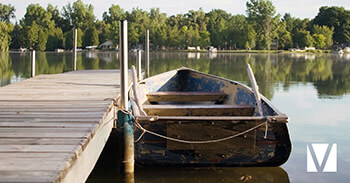
There are likely hundreds, if not thousands, of plats in Michigan where lakefront property is dedicated to the use of backlot owners in the plat. Michigan courts have routinely held that this language does not grant backlot owners riparian rights, meaning they cannot install a dock.
One way around this rule is to show that the plattor intended to grant riparian rights to backlot owners based on the circumstances that existed at the time of the dedication. With older plats, it is often difficult for backlot owners to present this type of evidence, but a recent Michigan Court of Appeals decision shows that when such evidence does exist, a backlot owner may have riparian rights.
In Mark A. Brown Trust v Kussy, the defendant owned a backlot in a plat along Hubbard Lake in Alcona County. The plat, created in 1935, dedicated a lakefront park for use of the lot owners. The plaintiff, who owned a front lot in the plat, argued that this language did not grant riparian rights. The defendant responded by presenting photographs showing that backlot owners had installed docks at the park since the 1930s.
The trial court concluded that backlot owners like the defendant had a right to install docks at the lakefront park. The Court of Appeals agreed, finding that photographs from the time of the dedication demonstrated that the plattor had intended to allow backlot owners to install docks at the park.
As this case illustrates, there are situations where backlot owners can establish riparian rights. For more information on disputes involving waterfront property, visit Varnum’s riparian rights page.
